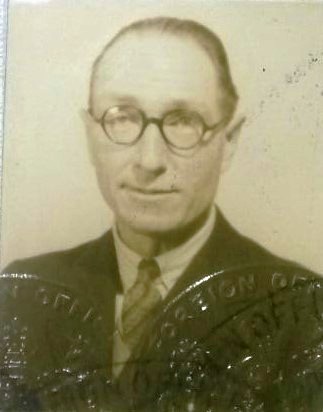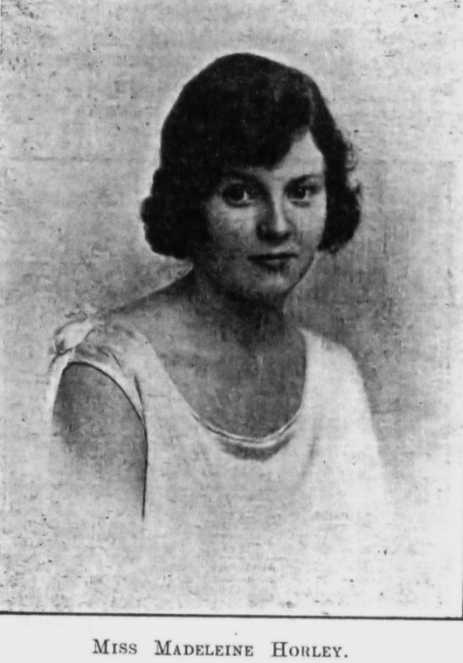View entry
Name: CUSHNY, Thomas Horatio (also spelt CUSHNEY)


Nee: son of John William Cushney/Cushny
Birth Date: 13 Sep 1900 Johannesburg
Death Date: 20 May 1977 Johannesburg
Profession: Farmer, Legion of Frontiersmen, Zanzibar clove industry; KAR
Area: Nairobi, Zanzibar
Married: 1927 Madeleine Elizabeth Horley b. 16 June 1904 Kuala Lumpur, d. 1983 Johannesburg
Children: Erica Fay (17 Oct 1930 Eldoret-2012); Dawn (21 Nov 1933 Eldoret); Ian (1939 Penzance-2016)
Book Reference: Red Book 1912
War Service: Merchant seaman
General Information:
S. African Military History Society, Military History Journal vol 4, no 2: Major Cushny writes: 'Was training for a commission in the new armies to go to France when the First World War came to an end. Obtained an Eastem Cadetship, as it was called, with prospects to go to China. Found it too tame however and joined the French Foreign Legion. Saw service with the Engineering Company of the l st Regiment when Abdul el Krim had defeated the Spaniards under Franco and was attempting to establish himself as Sultan of French Morocco and Caliph of all the Faithful. Escaped with the aid of my father who had seen service in Afghanistan and in the Jameson Raid.' Tom Cushny joined the Legion of Frontiersmen in London in 1923 on his way to the Far East. In Malaya, where he worked for a firm of non-ferrous ore merchants and smelters, he was commissioned for 'services to Intelligence' in the Indian Army Reserve of Officers, and was also Organizing Olficer for the Legion of Frontiersmen in Southern Sumatra, Siam and Perak. After six memorable and exciting years he returned to Britain rn 1929 from there he transferred to Kenya to take up farming 'but found prospecting for gold more profitable'.
In Kenya he was commissioned in the King's African Rifles Reserve of Officers and served as Intelligence Officer with the Kenya Defence Force. In 1934 Cushny obtained an appointment with the Clove Marketing Board in Zanzibar where he assumed duties as Organizing Otlicer of the Legion. During the riots of 7-12 February 1936 when an attempt was made to massacre the Europeans in Zanzibar and take over the reins of Government by force, Cushny commanded a platoon of Armed Police and was instrumental in the capture of 170 hostile Arabs and 450 weapons. For this action he received the 'thanks cf the Govemment' and those of H.H. the Sultan af Zanzibar.
The Legion Meritorious Service Medal was awarded to Cushny in November 1936 for his outstanding record of service. Whilst on leave in Britain in 1939, and realizing that World War II was inevitable, Cushny enlisted in his County Regiment, the Duke of Cornwall's Light Infantry. He served with the BEF in France, and later with the Home Forces during the Battle of Britain, the British Forces Northem lreland, the British Military Mission India, Persia-Iraq Force, Middle East Force, finally serving in Palestine and Transjordan.
After the War Major Cushny was seconded to the United Nations Relief and Rehabilitation Administration (1NIRRA) and worked in France, Switzerland, Poland, Germany and Italy, receiving the Diploma of Merit for services to humanity and for saving life in liberated Europe.In 1947 Major Cushny came to South Africa where he served as OC South Africa Command, Legion of Frontiersmen. He eventually settled in Rhodesia with his family, where he served as a Deputy
Warden in the British South Africa Police Special Reserve until his death in May 1977. (This article was forw.arded to the SA. National Museum of Military History by Major Cushny's widow Mrs Madeleine E. Cushny, shortly after his death.)
Red Book 1912 - T. Cushney - Nairobi
Web - Major Tom Cushny, LMSM, was born during the Anglo-Boer War of 1899-1902 of Scottish English parents. His early years were spent in British East Africa and at the age of 14 he was sent to a public school in Britain. Major Cushny writes - 'Was training for a commission in the new armies to go to France when the First World War came to an end. Obtained an Eastern Cadetship, as it was called, with prospects to go to China. Found it too tame however and joined the French Foreign Legion. Saw service with the engineering company of the 1st Regiment when Abdul el Krim had defeated the Spaniards under Franco and was attempting to establish himself as Sultan of French Morocco and Caliph of all the Faithful. Escaped with the aid of my father who had seen service in Afghanistan and in the Jameson Raid.' Tom Cushny joined the Legion of Frontiersmen in London in 1923 on his way to the Far East. In Malaya, where he worked for a firm of non-ferrous ore merchants and smelters, he was commissioned for 'services to Intelligence' in the Indian Army Reserve of Officers, and was also Organizing Officer for the Legion of Frontiersmen in Southern Sumatra, Siam and Perak. After 6 memorable and exciting years he returned to Britain in 1929 from where he transferred to Kenya to take up farming 'but found prosepcting for gold more profitable'. In Kenya he was commissioned in the KAR Reserve of Officers and served as Intelligence Officer with the Kenya Defence Force. In 1934 Cushny obtained an appointment with the Clove Marketing Board in Zanzibar where he assumed duties as Organizing Officer of the Legion. ……………. Whilst on leave in Britain in 1939, and realising that World War II was inevitable, Cushny enlisted in his County Regiment, the Duke of Cornwall's Light Infantry. He served with the BEF in Farnce, and later with the Home Forces during the Battle of Britain, the British Forces Northern Ireland, the British Military Mission India, Persia-Iraq Force, Middle East Force, finally serving in Palestine and Transjordan. After the War Major Cushny was seconded to the United Nations Relief and Rehabilitation Administration (UNRRA) and worked in France, Switzerland, Poland, Germany and Italy, receiving the Diploma of Merit for services to humanity and for saving life in liberated Europe. In 1947 Major Cushny came to South Africa where he served as OC South Africa Command, Legion of Frontiersmen. He eventually settled in Rhodesia with his family where he served as a Deputy Warden in the British South Africa Police Special Reserve until his death in May 1977.
